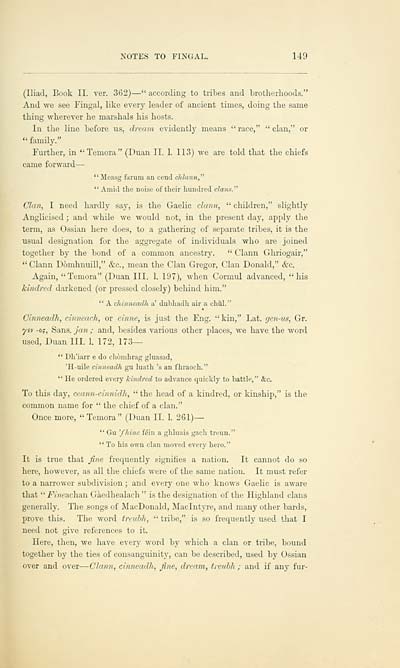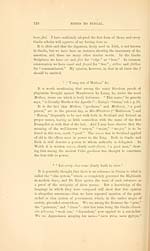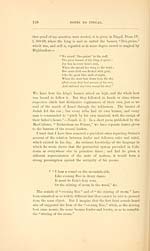Ossian Collection > Poems of Ossian > Volume 2
(159)
Download files
Complete book:
Individual page:
Thumbnail gallery: Grid view | List view

NOTES TO FINGAL. 149
(Iliad, Book II. ver. 362) — " accorJiag to trilies and brotherhoods."
And we see Fingal, like every leader of ancient times, doing the same
thing wherever he marshals his hosts.
In the line before us, dream evideutlj' means " race," " clan," or
"fiimily."
Further, in "Temora" (Diuui II, 1. 113) we are told that the chiefs
came forward —
" Measg farum an ceuJ chlann,"
" Amid the noise of their hundred claiis."
Clan, I need hardly say, is the Gaelic clann, " children," slightly
Anglicised ; and while we would not, in the present day, apply the
term, as Ossian here does, to a gathering of separate tribes, it is the
usual designation for the aggregate of individuals who are joined
together by the bond of a common ancestry. " Clann Ghriogair,"
" Clann Dòmhnuill," &c., mean the Clan Gregor, Clan Donald," &c.
Again, "Temora" (Duan III. 1. 197), when Cormul advanced, "his
kindred darkened (or pressed closely) behind him."
" A chinneadh a' dubliadli air a chill."
Cinneadh, cinnearh, or cinne, is just the Eng. "kin," Lat. geii-us, Gr.
yiv -o;, vSans. Jan ; and, besides various other places, we have the word
used, Duan III. L 172, 173—
" Dli'iarr e do chòmhrag gluasad,
'H-uile cinneadh gu luath 's an fhraoch."
" He ordered every kindred to advance quickly to tattle," &c.
To this day, ceann-cinnidh, " the head of a kindred, or kinship," is the
common name for " the chief of a clan."
Once more, "Temora" (Duan II. 1. 261) —
" Gu 'fhinc fèin a ghluais gach treun."
"To his own clan moved every hero."
It is true that fine frequently signifies a nation. It cannot do so
here, however, as all the chiefs were of the same nation. It must refer
to a narrower subdivision ; and every one who knows Gaelic is aware
that "■ Finea.c\\&i\ Gàedhealach " is the designation of the Highland clans
generally. The songs of MacDonald, Maclntyre, and many other bards,
prove this. The word treuhh, " tribe," is so frequently used that I
need not give references to it.
Here, then, we have every wonl by which a clan or tribe, bound
together by the ties of consanguinity, can be described, used by Ossian
over and over— CZann, cinneadh, fine, dream, treubh; and if any fur-
(Iliad, Book II. ver. 362) — " accorJiag to trilies and brotherhoods."
And we see Fingal, like every leader of ancient times, doing the same
thing wherever he marshals his hosts.
In the line before us, dream evideutlj' means " race," " clan," or
"fiimily."
Further, in "Temora" (Diuui II, 1. 113) we are told that the chiefs
came forward —
" Measg farum an ceuJ chlann,"
" Amid the noise of their hundred claiis."
Clan, I need hardly say, is the Gaelic clann, " children," slightly
Anglicised ; and while we would not, in the present day, apply the
term, as Ossian here does, to a gathering of separate tribes, it is the
usual designation for the aggregate of individuals who are joined
together by the bond of a common ancestry. " Clann Ghriogair,"
" Clann Dòmhnuill," &c., mean the Clan Gregor, Clan Donald," &c.
Again, "Temora" (Duan III. 1. 197), when Cormul advanced, "his
kindred darkened (or pressed closely) behind him."
" A chinneadh a' dubliadli air a chill."
Cinneadh, cinnearh, or cinne, is just the Eng. "kin," Lat. geii-us, Gr.
yiv -o;, vSans. Jan ; and, besides various other places, we have the word
used, Duan III. L 172, 173—
" Dli'iarr e do chòmhrag gluasad,
'H-uile cinneadh gu luath 's an fhraoch."
" He ordered every kindred to advance quickly to tattle," &c.
To this day, ceann-cinnidh, " the head of a kindred, or kinship," is the
common name for " the chief of a clan."
Once more, "Temora" (Duan II. 1. 261) —
" Gu 'fhinc fèin a ghluais gach treun."
"To his own clan moved every hero."
It is true that fine frequently signifies a nation. It cannot do so
here, however, as all the chiefs were of the same nation. It must refer
to a narrower subdivision ; and every one who knows Gaelic is aware
that "■ Finea.c\\&i\ Gàedhealach " is the designation of the Highland clans
generally. The songs of MacDonald, Maclntyre, and many other bards,
prove this. The word treuhh, " tribe," is so frequently used that I
need not give references to it.
Here, then, we have every wonl by which a clan or tribe, bound
together by the ties of consanguinity, can be described, used by Ossian
over and over— CZann, cinneadh, fine, dream, treubh; and if any fur-
Set display mode to: Large image | Transcription
Images and transcriptions on this page, including medium image downloads, may be used under the Creative Commons Attribution 4.0 International Licence unless otherwise stated. ![]()
| Early Gaelic Book Collections > Ossian Collection > Poems of Ossian > Volume 2 > (159) |
|---|
| Permanent URL | https://digital.nls.uk/77870305 |
|---|
| Description | Volume II of 'Poems of Ossian : in the original Gaelic with a literal translation into English and a dissertation on the authenticity of the poems / by the Archibald Clerk ; together with the English translation by Macpherson'. |
|---|---|
| Shelfmark | Oss.136 |
| Additional NLS resources: | |
| Attribution and copyright: |
|
| Description | Selected books from the Ossian Collection of 327 volumes, originally assembled by J. Norman Methven of Perth. Different editions and translations of James MacPherson's epic poem 'Ossian', some with a map of the 'Kingdom of Connor'. Also secondary material relating to Ossianic poetry and the Ossian controversy. |
|---|
| Description | Selected items from five 'Special and Named Printed Collections'. Includes books in Gaelic and other Celtic languages, works about the Gaels, their languages, literature, culture and history. |
|---|

